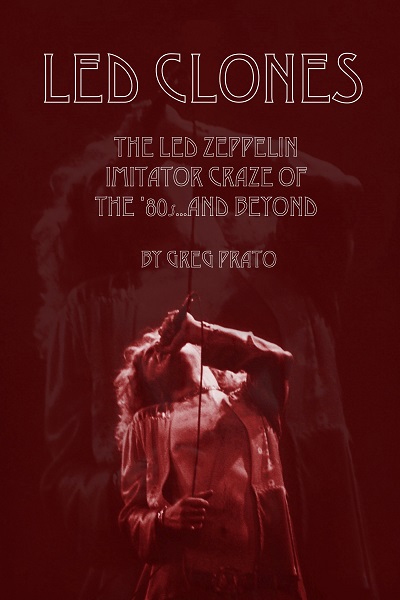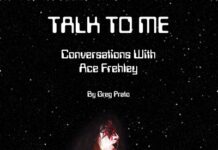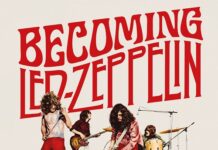By Greg Prato
Few bands in rock history have proven to be as enduring and influential as Led Zeppelin. And during the ’80s, there was an overabundance of “Zeppelin disciples,” or, as guitar great Gary Moore once put it, Led Clones.
And in 2024, I opted to thoroughly study the many artists who homed in on the Zeppelin sound (from the ’70s until the modern day, but with an emphasis on the ’80s), with the book Led Clones: The Led Zeppelin Imitator Craze Of The ’80s..And Beyond.
Below is an excerpt that focuses on the album that many point to as the one that opened the floodgates for subsequent Zep-influenced artists that could be heard throughout the ’80s: Billy Squier’s 1981 commercial breakthrough, Don’t Say No, which spawned such rock radio hits as “The Stroke,” “Lonely Is the Night,” “In the Dark,” and “My Kinda Lover.”
*
The first true Zep mimic of the ’80s would have to be Billy Squier. First hitting the record store racks as a member of obscure late ’70s rockers Piper, the band issued just a pair of albums (1976’s self-titled debut and 1977’s Can’t Wait), before going the way of the dodo. Securing his own solo deal shortly thereafter, Squier opened the ’80s with the so-so The Tale Of The Tape in 1980, which spawned the song “The Big Beat” – parts of which would later be sampled by some of the biggest hip-hop artists known to mankind (Jay-Z, Ice Cube, Run-DMC, etc.).
But it was with the arrival of 1981’s Don’t Say No, that Squier went all Zeppelin-y on us – both in the sonic and songwriting departments. And it sounds like hooking up with Queen’s then-producer, Mack (full-name: Reinhold Mack), was what set him on a direct path towards the houses of the holy. And as the bassist on Don’t Say No, Mark Clarke, recalled in 2024, “There was so much momentum from the record company, and the band was really great. [Drummer] Bobby Chouinard – ‘Mr. Big Beat’ – was always so upbeat. He had his problems, but we always forgave him and he drove it all. Bobby and I really kicked the whole bottom end in. It was thoroughly enjoyable. We did that in a matter of weeks – we did that whole album.
“Mack was one of the best engineers – still to this day – that I’ve ever worked with,” Clarke continues. “Geoff Emerick was another one of them – who did all the Beatles stuff. You’d go into the studio with Geoff, and you’d play in the studio and it sounds great. Most engineers, when you went back into the control room and listened back to it, you would say, ‘It doesn’t sound like that in the studio.’ Geoff and Mack, when you walked back into the control room, it sounded way more powerful than it did in the actual studio. And that’s what Mack brought. And Mack would make very quiet suggestions.”
Out of all the Led Clones past and present, the best album front to back quality and sonically-wise is quite possibly this LP, as Squier appears to have modeled it after the direction and production of the last two Zep studio LPs – Presence and In Through The Out Door – rather than the era most swiped from by others (1969-1975). For example, once the tune “Lonely Is the Night” kicks in at the 34-second mark, it sounds oh-so-close to Zep’s “Nobody’s Fault But Mine.” And the merger of synths or keyboards into the hard rock of “In the Dark” and “The Stroke” sounds not a million miles away from “In the Evening” and “Carouselambra” (the latter which is my personal choice for one of Zep’s most underrated tunes).
Clarke also remembers learning the news of a tragedy in the middle of recording one of the album’s aforementioned classics. “The night that we did ‘In the Dark’ was the night that John Lennon got shot [December 8, 1980]. We were doing it at the Power Station in New York. I went out in the reception area, and Billy is over there with everyone else watching television – totally in shock. Because of my Beatles connection [Clarke hails from Liverpool], he said, ‘Do you want to stop?’ I said, ‘No, I don’t want to stop. Let’s carry on.’ We did call it quits at about 2:00 or 3:00 in the morning. Billy and I lived very close to each other on the Upper West Side – I lived only about two blocks from the Dakota, and Billy was about four blocks away. So, the limo arrived at the studio to take us home, and the driver said, ‘We can’t got up the West Side because of what’s happened.’ I’ll never forget that.”
And while many felt that Squier’s music had an unmistakable quality to it – and in particular, the material on Don’t Say No – there are also gentlemen like Eddie Trunk, who doesn’t hear much sonic correlation between the Zeps and William Haislip Squier. “Billy Squier is a favorite artist of mine. And I always heard people talk about Don’t Say No sounding like Led Zeppelin. And I’ve got to be honest with you, I never felt that. And I still don’t. I could be wrong – obviously, everybody’s got their opinion. But I never listened to Don’t Say No and thought, ‘Oh, this sounds just like Led Zeppelin.’ I think a lot of people thought that in the tone of Billy’s voice, maybe. And yes, Bobby’s drumming. But still to this day, I just didn’t feel that was so ‘Zeppelin-y’.”




















